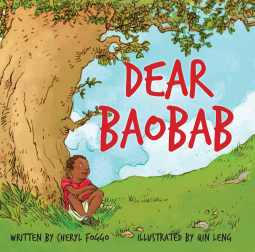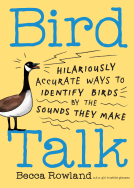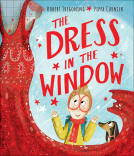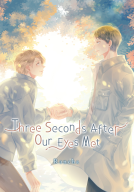
Dear Baobab
by Cheryl Foggo
This title was previously available on NetGalley and is now archived.
Send NetGalley books directly to your Kindle or Kindle app
1
To read on a Kindle or Kindle app, please add kindle@netgalley.com as an approved email address to receive files in your Amazon account. Click here for step-by-step instructions.
2
Also find your Kindle email address within your Amazon account, and enter it here.
Pub Date Sep 01 2011 | Archive Date Apr 04 2016
Description
Average rating from 10 members
Featured Reviews
Maiko has been transplanted from his home in Africa to live in the United States with his Aunt and Uncle. he misses the baobab tree in his village and connects with a little spruce tree growing outside his house. As the year progresses, Maiko learns about his new home and sees that although you can't always grow where you are planted, you can grow nevertheless.
 Sarah F, Librarian
Sarah F, Librarian
This is a beautiful story told with lyrical prose and inviting artwork.
 Carla J, Reviewer
Carla J, Reviewer
With everything going on in the world today with refugees trying to find a home this book is very timely (even though it was published a few years ago). Maiko has moved from Tanzania to Canada with his aunt and uncle. He has trouble fitting in at school, he is teased about having big ears, he misses his village and especially the Baobab tree. He sits on the porch and watches and listens to the spruce tree planted nearby. He tells the tree all about his feelings and what is happening in his new life. When he finds out that the tree might be cut down because it is too close to the house and might damage the foundation, he is upset, but does not tell anyone. This book is about changes in the life of this immigrant boy to Canada. It talks about how hard it is to fit in and explain your feelings to others. The illustrations are wonderful and help to explain the story. There is quite a bit of text on each page so this is not an early reader book, but one that can be used with older children, especially if they have new Canadians in their classroom.
 Harker D, Reviewer
Harker D, Reviewer
Dear Baobab was a sad story. It was a good story, make no mistake, but there was a lot of sadness in Maiko's story.
This book seems to be especially needed these days, with more refugee crises happening every day. Maiko has to find his way in this new place and comes up against adversity. There's the class "bully" who teases him about his big ears, there's the little spruce tree which he becomes attached to and which is threatened with being cut down simply because of where it grew.
Maiko doesn't actually do a lot in this book, if by not a lot you understand that it means no quests other than the one that is growing up. It's a difficult time and being in a new place and learning new things doesn't make things easier. By the end of the story, when Maiko turns 8, I think he's finally learning how to settle in with his new friend and the fate of his little spruce tree solidified.
This work was beautifully written. The language wasn't overly simplistic nor was it overly fancy. It found that middle balance where the words seem to engulf you in the story. Nothing magical or fantastical is happening, but you find yourself sinking into the story and feeling for the characters.
The artwork was, too, very good. It was easy to picture these pictures leaping off the page and surrounding the reader as they go through Maiko's story, like something right out of Reading Rainbow.
Readers who liked this book also liked:
Jason Chatfield; Scott Dooley
Comics, Graphic Novels, Manga, Entertainment & Pop Culture
Elizabeth Passarella
Essays & Collections, Humor & Satire, Religion & Spirituality


















